Monday, October 11,2021 / 12.05 PM/By AbdulQudus Isiaka,Proshare Research /Header Image Credit: Aso Rock Villa
Reactions continue to trail the release ofthe 2022 Budget Proposal titled: "Budget of Economic Growth and Sustainability," presented on Thursday by President Muhammad Buhari to the National assembly ina relatively brief session. The President's presentation was shortened. A moreelaborate presentation followed by the Minister of Finance, Budget, and Nationalplanning to a smaller gathering on Friday, October 8, 2021. Meanwhile, the N16.39trn budget presented bythe President estimates available revenue N10.13trn; this implies that theFederal government's fiscal operations could result in a N6.62trn deficit.
Analysts believe that the 2022 budget is inadequateto ease the plight of Nigerians. Particularly regards the country's fiscalposition, economists believe that alternative sources of government revenuesare needed to reduce the debt service cost. Debt service in 2022 may consume N3.61trn or22% of the budget. During hispresentation, the President assured Nigerians that the country's debt stock waswithin permissible limits. However, it confronts a revenue challenge that the governmentintends to address through the soon-to-be-introduced Strategic RevenueGeneration Initiative (SRGI).
Alook at the half-year Implementation report for the 2021 budget shows that asof May 2021, the Federal government's retained revenue was N1.844 trillion, whichamounts to 67% in terms of revenue; on the other hand, total expenditure wasN4.86 trillion, which represents 92.7% of expenditure performance. Essentially,the 2021 budget suffered revenue shocks significantly earlier in the year whenoil prices tanked, implying that a chunk of expenditure was met by deficitfinancing.
Assumptionsof the bill and comparison with those of last year
The2022 appropriation bill rests on the 2022-2024 medium-term economicframework and fiscal stability plan (MTEF/FSP) assumptions. The Expenditureframework, which was passed separately by the lower and upper chambers of theNational Assembly in a build-up to the President's budget presentation lastweek, assumed a conservative crude oil price of $57/barrel while alsoprojecting the production of 1.88mbpd (including condensate of300,000-400,000bpd). Given the COVID-19 vaccination rate and global recovery, economistsbelieve that the projected oil price appears plausible and prudent. However,the 1.88mbpd expected oil production rests on optimism about new investment inthe newly passed Petroleum Industry Act. The 2022 budget projects an exchange rate of410.15/$, a GDP growth rate of 4.2%, and a 13% Inflation rate. The World Bankprojects Inflation for 2021 to be much higher at 16%.
Illustration 1: Assumptions of the 2022 Proposed Budget
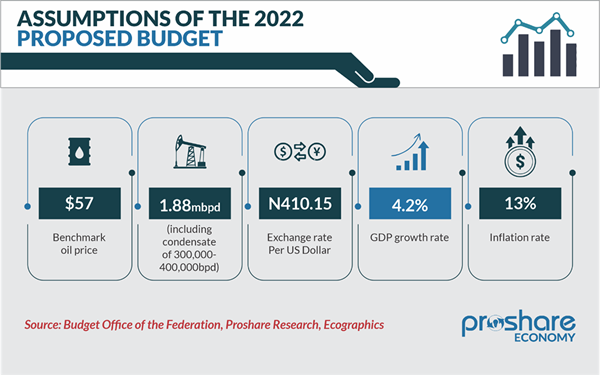
Budget 2021 in Bold Basic Numbers
The federal government intends to spend atotal of N16.39trn in 2022. While the ideal budget size as a proportion of GDPhas always been a talking point, analysts note that the 2022 appropriation billrepresents a 20.6% increase over the 2021 budget. At a little over 10%, Nigeria'sBudget to GDP ratio is substantially lower than peer countries. Economistshave noted that the average African budget to GDP ratio is about 50%. Theappropriation bill budgets only N78,000 for each Nigerian.
How the Budget gets spent in 2022
Of the N16.39trn planned spending,statutory transfer accounts for N768.28bn, corresponding to 4.6% of the budget.In 2021, statutory transfers had accounted for N497bn ( 3.6% of last year'sbudget). Non-debt recurrent cost is projected to be N6.8trn, N1.24trn higherthan the amount incurred in the previous year. N5.35trn would go into capitalexpenditure, compared to the 2021 budget, this marks a 29.5% increase in theamount allocated to capital projects. As a proportion of the entire budget,capital expenditure (including the capital component of statutory transfers)accounts for 32.64% of government planned spending in 2022; this is slightlylarger than the 30.4% share of the budget that capital expenditure got lastyear. Debt service in 2022 is expectedto consume 3.61trn, and while in absolute terms this is higher than last year'sdebt service cost by about N400bn, it is 22% of the budget, slightly lower inproportional terms than last year when it accounted for about 23% of the budget. The Federal Government is expected toincur N1.1trn on Personnel costs whilePensions, gratuities, and retiree's benefits are projected at N577bn. The proposedbudget also shows that overheads would take up N792.39b.
Illustration 2:Breakdown of Expenditure in the Approved 2021 Budget & the 2022Proposed Budget (in Naira)
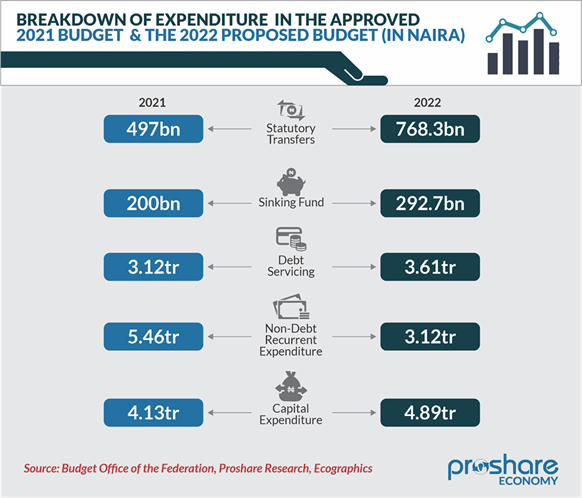
Proposed Revenue Sources for the 2022 Budget
Totalfederally collectible revenue is projected at N17.7trn in 2022. Contrnibutable revenue, on the other hand, isexpected to reach N12.72trn. However, the Appropriation bill projects that totalrevenue available to fund the 2022 federal budget as N10.13trn this includesgrants and aids (N63.38bn) and income from government-owned enterprises(GOEs).N3.16trnn is expected to be generated as oil proceeds, while non-oil revenue accountsfor N2.13trnn. Independent revenue accruing to the Federal government isexpected to come in at N1.82trnn.
Whilethere has been a steady rise in Independent revenue, about 30% of retained incomein 2022 is expected to derive from oil proceeds. Analysts note that given the oilmarket's volatility, the federal government is vulnerable to fiscal shocks.
Illustration 3:Analysis of Revenue sources in the 2022 Proposed Budget ( N'trnn)
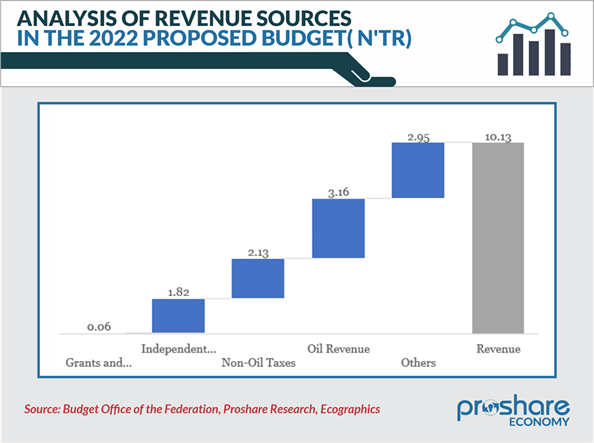
Budgetdeficit to GDP exceeds the fiscal responsibility act 2007 threshold
"We need to exceed thisthreshold considering our collective desire to continue tackling theexistential security challenges facing the country"-President Muhammadu Buhari
Further analysis of thebudget proposal shows that the Federal government's fiscal operations in 2022are projected to result in a deficit of about N6.26trn. The figure amounts to3.39% of the country's GDP, which exceeds the recommended threshold of 3% asstated in the Fiscal Responsibility Act 2007. In his defence of the higher budget deficit to the GDP ratio, thePresident cited instances of many other countries around the world that have,of necessity, also exceeded their fiscal thresholds for the economies tosurvive and thrive.
Analysts argue that althoughfiscal deficits can have countercyclical effects in recessionary times, significantand consistent budgetary deficits could be inflationary and are capable ofcrowding out private borrowing. InNigeria, budget deficits have perennially been a fixture of the federalgovernment's fiscal plans. In the approved 2021 budget fiscal deficit was 3.93%of the GDP, while in 2020 deficit as a proportion of GDP was 3.57% (see illustration1 below)
Illustration 4: Trendof Budget Deficit to GDP ratio (2010-2022)
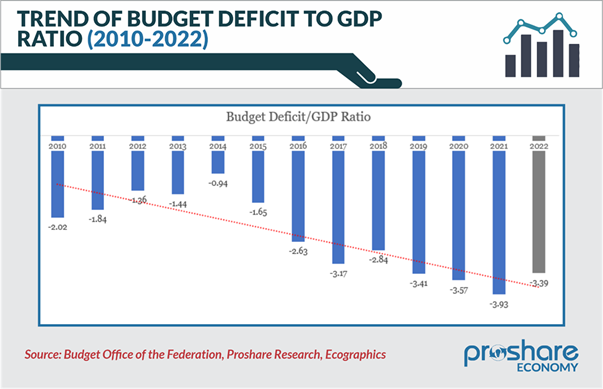
Generally,analysts distinguish between deficits arising from extra spending and deficitsdue to lower revenues. When the formeris the case, specific sectors witness a short-term improvement. However, wheredeficits arise from lower revenue, as in the Nigerian case, no such stimulus islikely to occur. In his address, the President alluded to the latter, notingthat the country's increasing debt stock is lower government revenue.
However, he assured the countrythat through policy reforms around tax administration, a review of the policyeffectiveness of tax waivers and concessions, as well as other RevenueMobilization enhancement strategies to be introduced in 2022, tax and exciserevenues should be enhanced, customs revenue through the e-Customs and SingleWindow initiatives would also be able to fund the country's significant infrastructuralneeds.
Meanwhile, justifying thecountry's rising debt profile, the President stated: "We have witnessed twoeconomic recessions within the period of this Administration. We had to spendour way out of recession in both cases, which necessitated growing the publicdebt. It is unlikely that our recovery from each of the two recessions wouldhave grown as fast without the sustained government expenditure funded by debt."
How the Pieis sliced- Budgetary allocation to Critical Sectors
The 2022 Appropriation billbudgets capital expenditure of N111.8bn for the Educational sector and N593.47bn for the Ministry's recurrentexpenditure. Meanwhile, the Ministry of Health was awarded N462.63bn forrecurrent non-debt expenditure but received N116.67bn for capital projects. TheMinistry of Defense and the office of the National Adviser get 155.04bn andN46.6bn respectively for capital projects and equipment. The Ministry of Works gets31.935bn for recurrent expenditure and 388.51bn for capital projects.
In per capita terms, the 2022budgetary allocation to the educational sector provides a meagre N517 worth of capitalexpenditure for each of the country's estimated population of 216millionpeople. In terms of Health, N537 is provided for the average Nigerian whileDefense and Security appropriate N717.8 capital spending to each Nigerian. Interms of Infrastructure, each Nigerian gets N1798 worth of capital projects.
These meagre allocationsfurther support the argument that the Nigerian government is underspending, andso rather than reduce spending, the government needs to find more sustainablesources of revenue. In anarticle, 'Fasua's 15trn budget proposal', Tope Fasua, economist and publiccommentator, noted that the per capita budget in Nigeria has always beenbetween $115 and $130, which makes the average Nigerian less catered for thanthe average Kenyan, Moroccan. Macau, Lithuania, Oman, Belarus, and war-tornLibya also perform better in revenue generation.
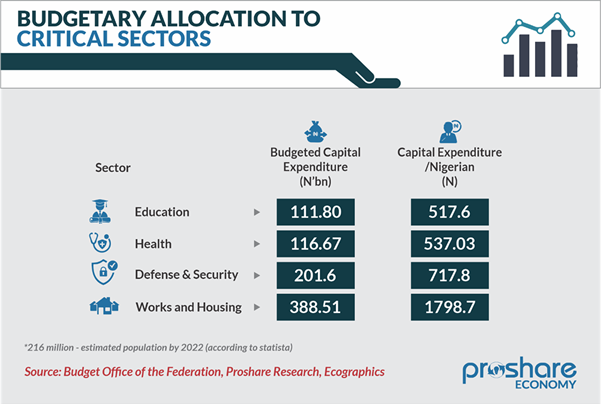
A Problemand a Promise
"Our target over themedium term is to grow our Revenue-to-GDP ratio from about 8 percent currentlyto 15 percent by 2025. At that level of revenue, the Debt-Service-to-Revenueratio will cease to be worrying. Put simply, we do not have a debtsustainability problem, but a revenue challenge which we are determined totackle to ensure our debts remain sustainable."-President Muhammadu Buhari
Promises are like pie crust,but budgets are supposed to be a moral document and a critical fiscal tool throughwhich the yearnings of the populace can be realized. Budgets generally require asmuch clarity about the end as about the means. The President's Speech and the addresses of the hierarchy of the fiscalauthorities seem to suggest that Nigerians should continue to endure theproblem of high debt costs, at least in the near term. At the same time, thecountrny fixes its revenue problems.
In an article titled "Findinga Way Out of Nigeria's High Debt Costs," Dr. Ayo Teriba highlighted what, in hisopinion, was 'the only sensible way' to solve the debt servicing problemsfacing the government. According to Teriba, the rising debt to GDP ratio hasbecome a trend in developing and emerging economies taking advantage of the opportunitiesavailable to issue non-interest-paying obligations. These countries are alsoexploring the issuance of public asset-linked debt instruments that areconvertible to equity. The securitization of assets has the potentials forreducing debt service and improving Nigeria's fiscal position.
From HereForward
While the commitment shown bythe legislature and the executive arm of government to achieve a January toDecember fiscal calendar deserves commendation, in order not to make budgetpresentations a mere constitutional traditional, the budget implementation mustbe of top priority. The Federal government must ensure that the budgetaryallocations and releases are made as and when due. Simultaneously, the Federalgovernment needs to reach out to the zones on budget implementation to carrycitizens along to assuage social restiveness.
Urgently, the Federalgovernment needs to consider alternative sources of revenue more seriously toaddress the revenue challenges the country is faced with.
The Strategic RevenueGenerating Initiatives (SRGI) is a breath of fresh air; however, more stringentcontrols need to be put in place to ensure that GOEs comply with the required Costto Income threshold of 50% and where penalties need to be imposed, they should.Likewise, proceeds from concessions and privatization programs can be increased,as a proportion of retained revenue privatization proceeds currently accountsfor only 3%. Similarly, the government needs to diversify its revenue source. About50% of the government revenue is currently related to the volatileinternational oil market, which has made revenue shocks the order of the day.
The situation with low taxrevenue also needs to be addressed; according to the world bank, Nigeria hascontinued to achieve a 5-6% tax revenue to GDP ratio -the lowest in the world.Analysts, however, argue that the failure to pay taxes by eligible citizens isan outcome of the large amount of informal taxes paid to pon-state actors. Accordingto the FIRS chairman, the Nigerian tax base comprises 41million people (taxbase). Only N1trn was generated last year in direct taxes; this is inextricablylinked with the prevalence of non-state actors and the illegal taxes they levy.Citizens would tend to avoid official taxes if they were not relieved of the currentunofficial taxes.
There equally is a need tohold the feet of sub-nationals to the fire, as the National budget (or Nationalcake) includes both federal and state budgets. When state governments fail tolive up to their duties, and all the attention is focused on the federalgovernment, there is a misalignment of revenue and responsibilities at the nationallevel, in which case, too little is available for the Federal government toallocate too many competing areas. Finally, analysts believe the governmentmust consider new ways of tackling the problem of insecurity in the country;N985.75bn was given to Defense for recurrent expenditure- such a situation constrainsthe resources available for growth-stimulating, job-creating public spending.
Download PDFsHere - Budget 2022: Budget of Economic Growth and Sustainability
2022 FGN Budgetproposal - Public Presentation
Related Link
1. Fasua's N15trn Budget Proposal - Punch - Nov 07, 2018
Related News
1. Budget 2022:Budget of Economic Growth and Sustainability
2. Nigerian Bond Issue 4 times Oversubscribed but Pricing Expensive
3. A Smaller Deficit Masked by Delayed Budgetary Releases
4. $4bn Eurobond: Implications for the Currency and Fiscal Position
5. Senate Approves Medium-Term Expenditure Framework
6. Nigeria Raises USD4bn through Eurobonds; 30-Year Eurobonds Raised at8.25%
7. An Aggressive Fiscal Stance in 2021
8. Finding a Way Out of Nigeria's High Debt Costs - Ayo Teriba
9. External Borrowing Plan: Presidency Lists Projects, Beneficiaries
10. Fitch Assigns Nigeria's Proposed USD Bond 'B' Rating
11. Nigeria Back at International Capital Market with Eurobond Offer
 Lagos, NG • GMT +1
Lagos, NG • GMT +1










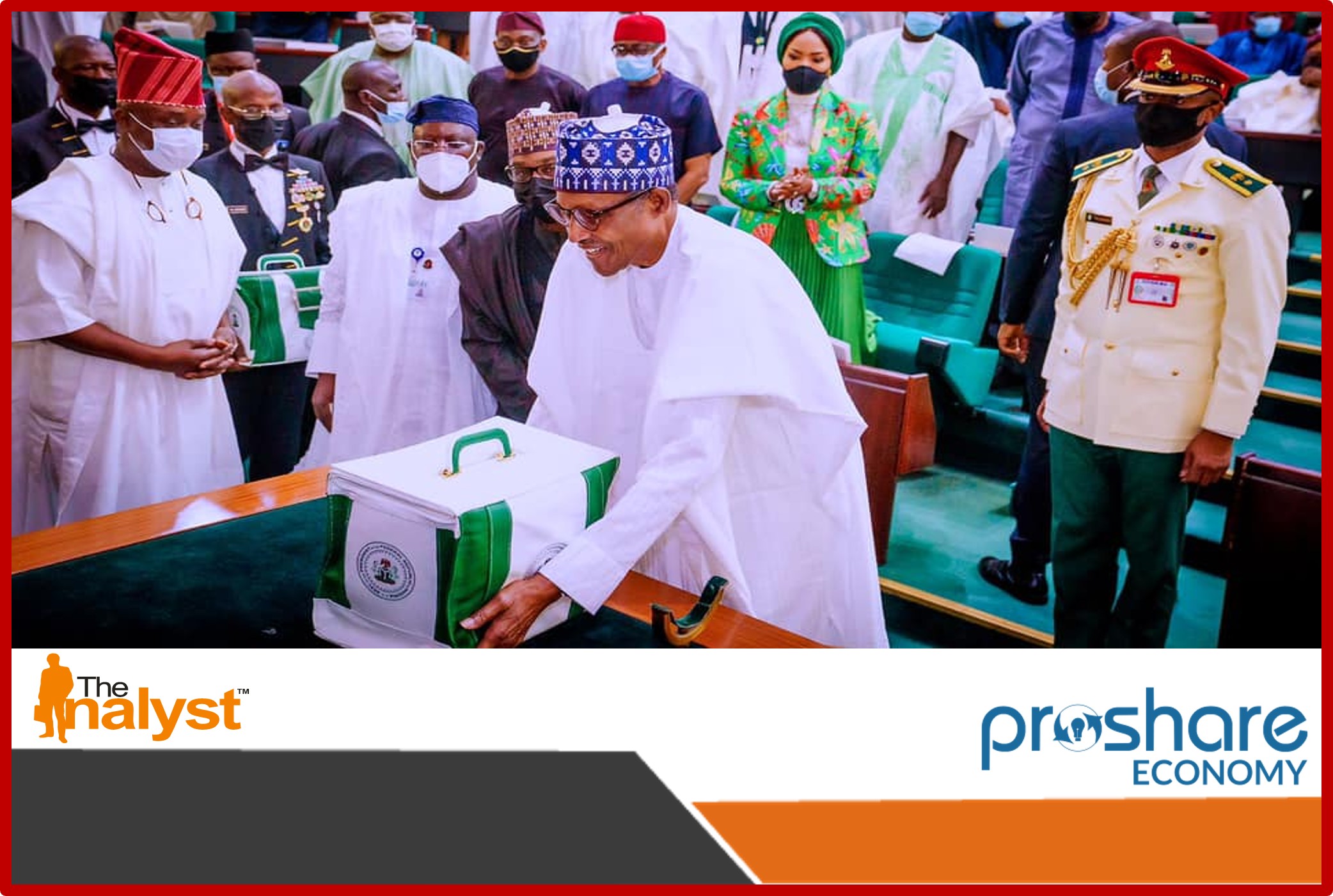
 2796 views
2796 views





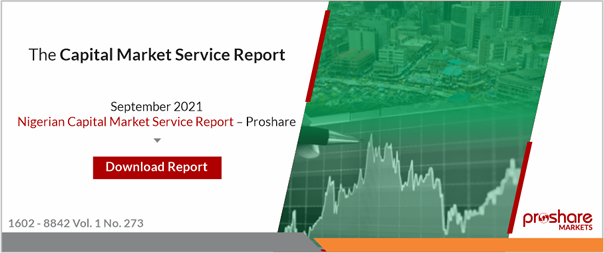





 Sponsored Ad
Sponsored Ad
 Advertise with Us
Advertise with Us









